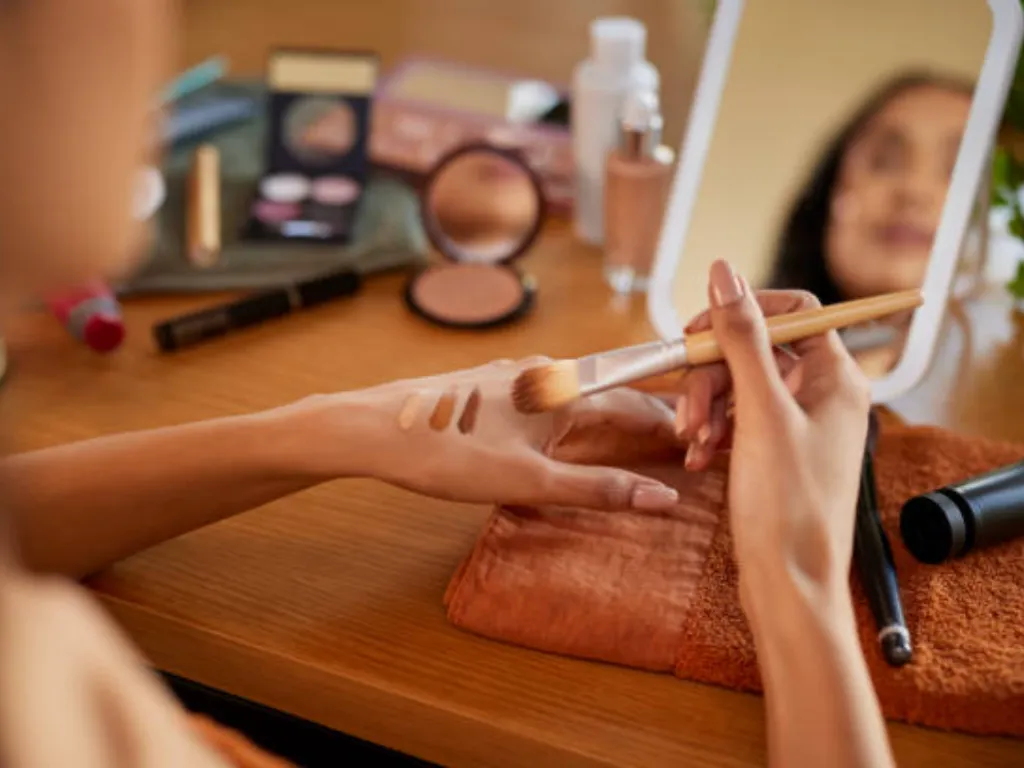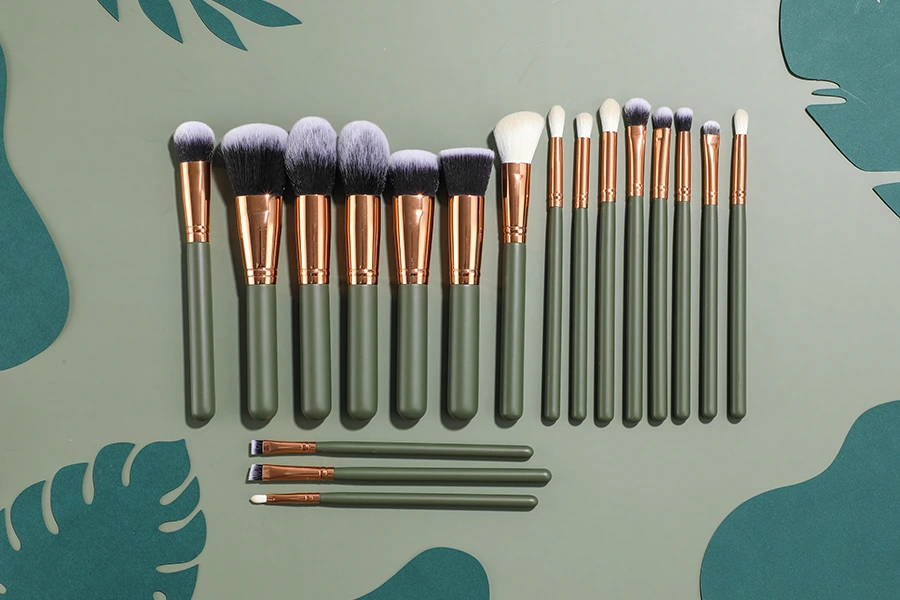Every makeup lover knows that the right tools can transform a beauty routine. From daily applications to special occasions, having the right cosmetic tools can elevate your look. Among these essentials, the debate between a concealer brush vs beauty blender often comes up. Each option offers unique benefits for achieving flawless coverage and a smooth finish. In this blog, we’ll explore the features, pros, and cons of both tools, helping you determine which one best suits your makeup style and needs.
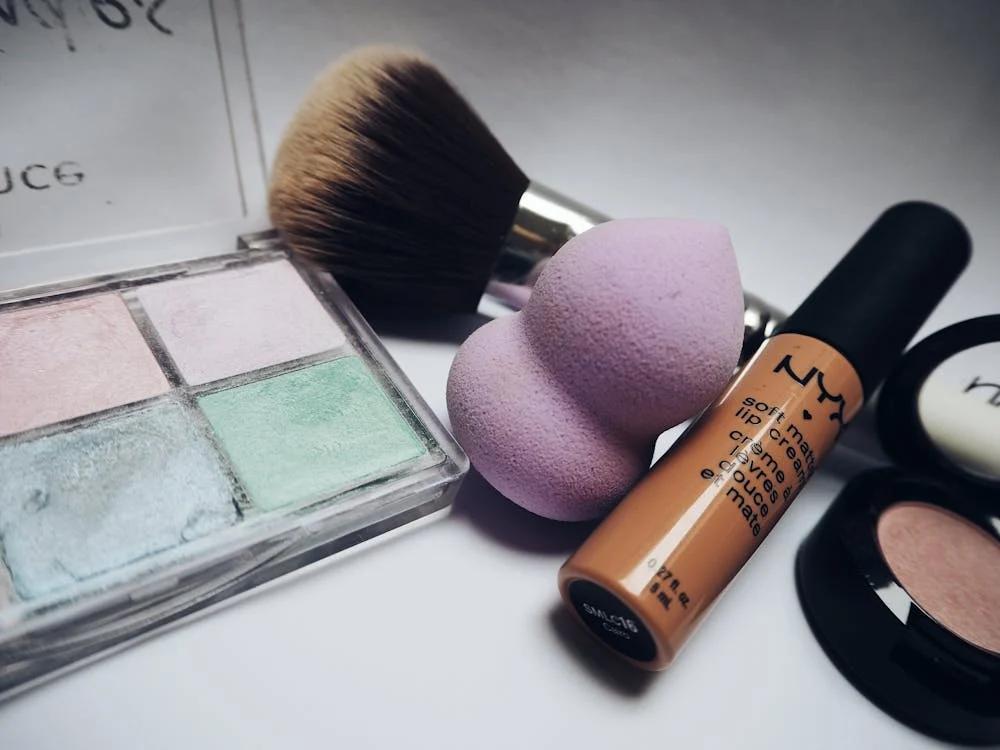
What Is a Concealer Brush?
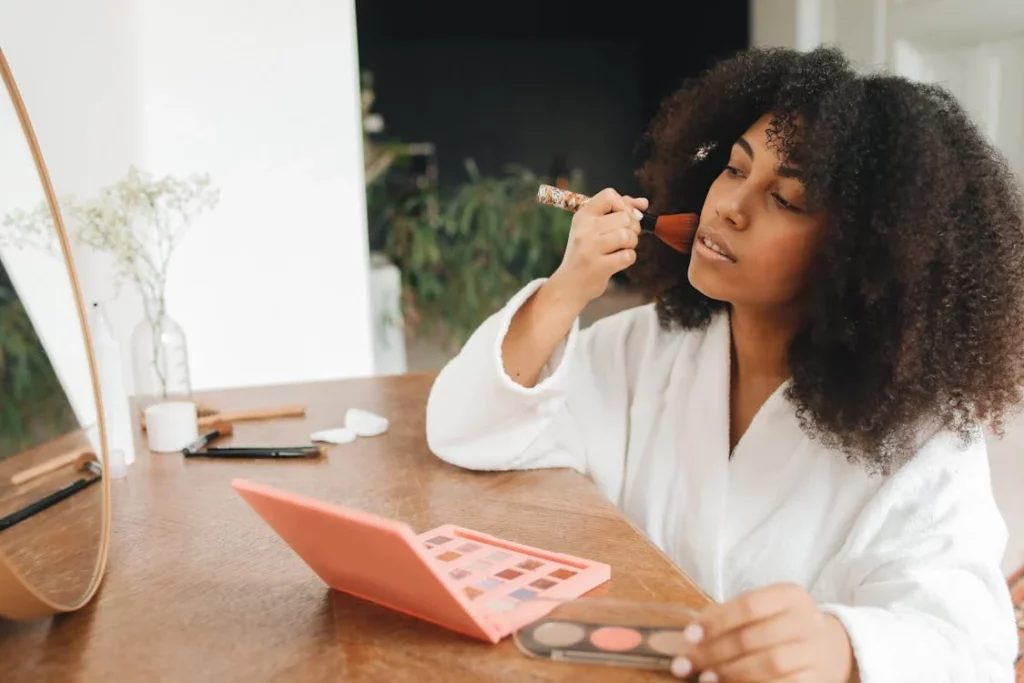
A concealer brush is a finely crafted tool specifically designed to apply and blend concealer with precision. Typically, it has synthetic bristles that allow it to pick up liquid, cream, or powder concealers without absorbing too much product. The shape is optimized for targeted application, helping users achieve full coverage in even the smallest areas, such as around the eyes or along the sides of the nose.
What Does a Concealer Brush Look Like?
The appearance of a concealer brush can vary slightly based on the brand, but most have a tapered or flat head with densely packed bristles. These brushes often resemble miniature versions of foundation brushes. The small, controlled brush head allows for detailed application, offering the flexibility to layer the product or blend it seamlessly into the skin. Some concealer brushes also have a rounded tip, which is ideal for softening edges and diffusing the product.
What Is a Beauty Sponge?
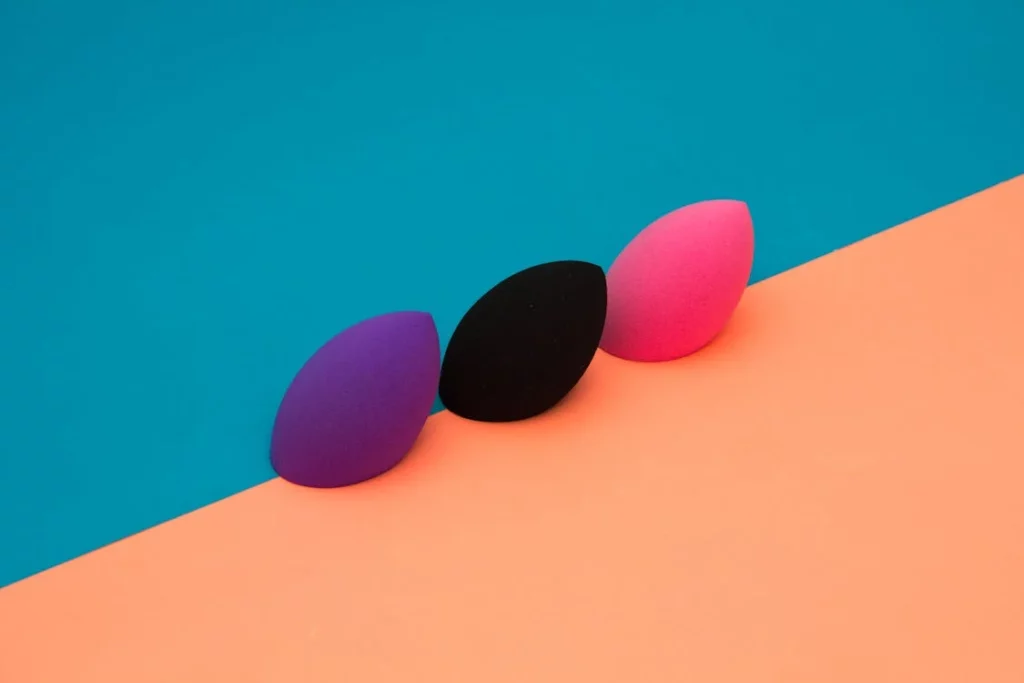
A beauty sponge, commonly known by brand names like the BS-Mall and Beauty Blender, is an egg-shaped, sponge-like applicator designed to create a flawless finish. Its primary function is to blend foundation, concealer, and other complexion products, ensuring smooth and even coverage. Unlike traditional sponges, these are usually latex-free and have a soft, bouncy texture, allowing for both wet and dry application.
What Are Makeup Sponges For?
Makeup sponges are designed to create an airbrushed finish. They are particularly effective at blending out liquid and cream products for a seamless, streak-free look. Sponges can be used to apply foundation, concealer, highlighter, and even powder, making them versatile in any makeup routine. Their ability to sheer out heavier products makes them ideal for achieving natural, dewy finishes.
Concealer Brush vs Beauty Blender: Pros and Cons
When it comes to applying concealer, the choice between a concealer brush and a beauty blender often sparks debate among makeup enthusiasts. Each tool boasts unique strengths and weaknesses that can significantly influence your makeup application. Let’s examine the pros and cons of both options to see which one aligns best with your makeup goals.
Pros of Concealer Brush
- Precision Application: The primary advantage of a concealer brush lies in its ability to deliver targeted application. Its tapered bristles allow users to reach small areas, making it perfect for concealing blemishes, dark circles, or imperfections with accuracy.
- Control and Versatility: With a brush, users can control the amount of product applied, enabling the layering of concealer for a fuller coverage effect. This control also extends to blending, allowing for detailed work around the eyes and nose.
- Ideal for Cream Formulas: Concealer brushes excel with thicker cream products. They can pick up and distribute these formulations effectively, ensuring that the product adheres well to the skin.
- Easier Cleanup: Brushes typically require less maintenance than sponges, as they can be easily cleaned with soap and water. Additionally, they don’t absorb as much product, reducing waste over time.
Cons of Concealer Brush
- Less Blending Capability: While brushes offer precision, they may struggle to achieve the seamless blend that sponges provide. This can lead to visible brush strokes if not blended carefully.
- Learning Curve: Using a concealer brush effectively requires some practice. New users might find it challenging to achieve a flawless look without streaks.
Pros of Beauty Blender
- Natural Finish: Beauty blenders excel in creating a soft, airbrushed finish. When dampened, they provide a dewy, seamless application that mimics the look of skin, which is particularly appealing for those seeking a more natural appearance.
- Versatility: These sponges can be used for various products, including foundation, highlighter, and even powder. Their unique shape allows for different techniques, making them adaptable for different areas of the face.
- Easy to Use: Beauty blenders are generally user-friendly, making them suitable for beginners. The bouncing technique simplifies application and blending, reducing the risk of streaks.
- Less Product Waste: When used correctly, beauty blenders can help to minimize product waste compared to brushes, as they blend the product directly into the skin rather than sitting on top.
Cons of Beauty Blender
- Absorption Issues: One significant drawback is that beauty blenders absorb a fair amount of product, which can lead to wasted makeup. This is particularly true for thicker formulations, where excess product can be lost within the sponge.
- Maintenance Requirements: Sponges require regular cleaning to avoid bacteria buildup, which can lead to skin issues. Unlike brushes, they need to be washed thoroughly after each use to maintain hygiene.
- Not Ideal for Precise Application: While beauty blenders are excellent for blending, they may not provide the same level of precision as a brush. This can make spot concealing or detailed work more challenging.
Concealer Brush vs Beauty Blender: How to Choose?
Brush or beauty blender for concealer? It largely depends on your personal preferences and makeup application goals. Here are some key considerations to help you make an informed decision:
- Desired Finish: If you aim for a natural, skin-like finish, a beauty blender is the way to go. Its dampened texture helps create a seamless blend, making it ideal for those who prefer a lighter, more radiant look. Conversely, if you want a more polished and full-coverage appearance, a concealer brush offers greater precision and control, allowing for targeted application in specific areas.
- Type of Concealer: Consider the formula of the concealer you typically use. For thicker, cream-based concealers, a brush is often more effective at picking up and distributing the product evenly. On the other hand, liquid concealers pair well with beauty blenders, as the sponge can help shear out the product for a lighter finish.
- Application Technique: Your preferred application method plays a crucial role in your choice. If you enjoy a more methodical approach, using a brush can provide the control needed for precise placement and layering. If you prefer a quicker, more forgiving method, a beauty blender’s bouncing technique simplifies blending and can save time.
- Skin Type: Your skin type can also influence your decision. For dry skin, a beauty blender can help hydrate the complexion and create a dewy finish. However, if you have oily skin, a concealer brush may be more effective at applying a matte formula that adheres better to the skin.
- Convenience and Maintenance: Finally, consider the convenience and upkeep of each tool. Brushes generally require less frequent cleaning than beauty blenders, which need to be washed after each use to prevent bacteria buildup. If you prioritize convenience, a brush might be the better option.
How to Use a Concealer Brush and Beauty Sponge?
Mastering the application of concealer can elevate your makeup game, and knowing how to use both a concealer brush and a beauty sponge effectively is essential. Each tool has its unique method, allowing for various techniques to achieve the desired coverage and finish. Here’s a step-by-step guide for using each tool to ensure flawless results.
Concealer Brush Tutorials
Using a concealer brush allows for precision application and targeted coverage. Follow these steps for optimal results:
- Prep Your Skin: Start with a clean, moisturized face. Applying a primer can help the concealer adhere better.
- Choose Your Concealer: Select a concealer that matches your skin tone or is one shade lighter for brightening areas like under the eyes.
- Pick Up the Product: Dip the brush into the concealer, ensuring the bristles are coated but not overloaded.
- Apply to Problem Areas: Use the brush to apply the concealer directly onto blemishes, dark circles, or redness, focusing on small sections at a time.
- Blend Gently: Using short, controlled strokes, blend the edges of the concealer into your foundation. For areas like under the eyes, a gentle dabbing motion helps maintain coverage.
- Layer If Necessary: For more coverage, allow the first layer to dry slightly before applying a second layer using the same technique.
- Finish With Powder: Set the concealer with a light dusting of translucent powder to prevent creasing and enhance longevity.
Beauty Sponge Tutorials
Using a beauty sponge can create a natural, airbrushed finish. Here’s how to use it effectively:
- Dampen the Sponge: Wet the beauty sponge under running water and squeeze out any excess moisture until it feels damp, not dripping.
- Prepare Your Concealer: Similar to the brush, choose a concealer that suits your needs.
- Apply Concealer Directly: Dot the concealer onto the areas you want to cover, such as under the eyes or on blemishes.
- Bounce to Blend: Using the rounded end of the damp sponge, gently bounce it over the concealer, pressing it into the skin for a seamless blend.
- Use the Pointed End for Detail: For precision, use the pointed end of the sponge to blend concealer in smaller areas, such as around the nose or in the inner corners of the eyes.
- Build Coverage as Needed: If additional coverage is required, repeat the dabbing process, layering the product gradually.
- Set the Look: Finish by applying a light layer of setting powder to keep the concealer in place throughout the day.
Conclusion
Ultimately, the choice between a concealer brush vs beauty blender comes down to your personal preferences and makeup goals. Both tools have distinct advantages, allowing you to achieve different looks depending on your needs. Whether you opt for the precision of a brush or the seamless finish of a beauty blender, experimenting with both can elevate your makeup game. So, why not try them out and discover which one becomes your go-to tool for flawless concealing?















